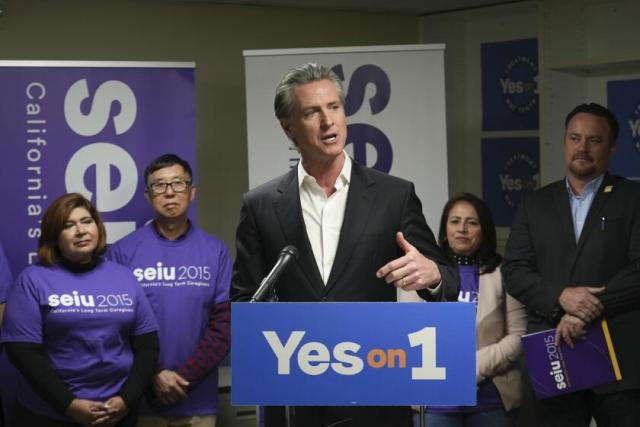Politics
California’s Homeless Strategy Inches Forward Amid Concern, Serving as a Cautionary Tale for Newsom
In the heart of the California Homelessness Crisis, a pivotal ballot measure stands on the precipice of approval, signaling a potentially rocky road ahead for Governor Gavin Newsom’s ambitious plans to tackle the crisis. Proposal 1, aimed at addressing homelessness and mental health challenges, is currently on the cusp of passage. It seeks authorization for the issuance of $6.4 billion in bonds. In the preliminary count from the March 5 election, it holds a slim lead of less than half a percentage point.
Uncertain Future as Final Tally Awaited
The fate of the ballot measure remains uncertain. As of Thursday, officials have counted approximately 89% of the votes, but the final tally is still pending completion. Proponents of the measure express cautious optimism despite the close margin. “They note that they anticipate the remaining votes will secure its approval.” However, the narrow margin underscores a sobering reality: support for Governor Newsom’s agenda appears to be waning.
“The fate of the ballot measure is uncertain. Proponents express cautious optimism, but Governor Newsom’s support wanes,” according to Bloomberg Digital Subscription.
Governor’s Vision at Stake
At the core of Proposition 1 lies Governor Newsom’s vision to overhaul California’s mental health care system. It aims to address the persistent issue of homelessness, affecting more than 180,000 individuals across the state. The proposal includes the establishment of CARE Courts, intended to mandate treatment for those grappling with severe mental illnesses. Additionally, it involves the provision of additional housing, particularly for veterans.
Political Scrutiny
The tight race has prompted scrutiny from political observers, who interpret the narrow margin as a warning sign for the governor’s administration, particularly in light of the California Homelessness Crisis. Democratic State Senator Dave Cortese characterized the outcome as a “significant disappointment” for Newsom, emphasizing Proposition 1 as a cornerstone piece of legislation for the governor’s agenda, especially in addressing the California Homelessness Crisis.
Governor’s Confidence
However, Newsom’s camp remains steadfast, downplaying concerns about diminishing support. Anthony York, a spokesperson for the governor, emphasized the significance of Proposition 1. He labeled it as “the most significant reform to our mental health system in decades.” Despite the challenges, York expressed confidence in the measure’s eventual success, noting that substantial victories often come by narrow margins.
Demographic Dynamics
Yet, the demographic dynamics of the election reveal potential hurdles for Newsom’s initiatives. In a state where registered Democrats outnumber Republicans by a ratio of 2-to-1, early voting data indicates a larger turnout among Republican voters, potentially influencing the outcome of Proposition 1.
Public Frustration
Ron Galperin, a former Los Angeles city controller, pointed to widespread frustration among Californians regarding the allocation of funds towards homelessness. He emphasized that despite investing significantly financially, they are not seeing tangible results. “People are frustrated,” Galperin stated. “They witness cities, counties, the state, and the federal government allocating a significant amount of funding towards addressing homelessness.” Yet, they’re not seeing the desired outcomes.”
Critical Juncture
As the final votes tally, Governor Newsom confronts a critical juncture in his efforts to address one of California’s most pressing challenges. The fate of Proposition 1 hangs in the balance. The outcome of this ballot measure may well serve as a bellwether for the future of homelessness policy in the Golden State.
Subscribe now for a two-year WSJ Print Edition, plus digital access on iPhone, Android, and PC. Stay informed on finance, politics, and more. Sign up today and save up to 70%.
For more information, please contact the following telephone number:
WSJ Phone Number: (800) 581-3716

